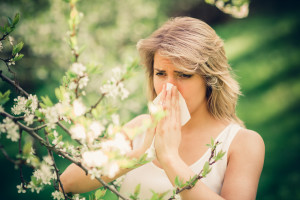 Allergic reactions in the body occur when your immune system goes into overdrive. Your immune system is a natural defense system that fights against bacteria and viruses. When it detects these harmful invaders, it releases antibodies, which fight them off.
Allergic reactions in the body occur when your immune system goes into overdrive. Your immune system is a natural defense system that fights against bacteria and viruses. When it detects these harmful invaders, it releases antibodies, which fight them off.
The immune system will sometimes release antibodies to fight off things that are harmless such as dust, pet dander and pollen. Histamines are released in the body, thinking it’s being attacked, which results in rashes, itchy eyes, nausea and runny noses. This is an overreaction from the immune system thinking it needs to protect you.
The types of harmless materials that the body overreacts to are:
- Medicine: even though medicine is meant to help you, your body might view it as a foreign substance. This is true for both prescription and over-the-counter medicines. Reactions can vary from mild to severe.
- Food: as unusual as this is, foods can trigger the body to overreact. The most common types of food allergies are: Peanut, Tree Nut, Shellfish, Milk, Soy, and Gluten. Allergic reactions can vary from person to person. Wheezing, anaphylaxis and swelling are severe reactions that need immediate medical attention.
- Insect stings: the venom from an insect sting can cause a slight bump, rash, itch or soreness for most people. For some, the venom is seen as an attack on the body, which it is, and an overload of histamines are sent into the body.
- Latex: allergies to latex can take form in individuals who are exposed to latex in large amounts. Those who work in healthcare being one. Reactions can vary from a rash to anaphylaxis, depending on the individual and severity.
- Animals: pet dander and saliva of your pets may cause troubles such as itchy skin and wheezing.
- Seasonal: allergies to pollen, grass, trees and other natural substances that occur on a seasonal basis. Many people are afflicted with this type of allergy.
The immune system sends out an overabundance of histamines when it encounters these allergens. Taking an oral or topical anti-histamine can relieve mild symptoms. An injection of epinephrine may be required in severe cases when the body goes into anaphylaxis. If anaphylaxis occurs, contact 911 immediately.
Anaphylaxis symptoms:
- Rapid swelling of the entire body or one area of the body. Swelling of the lips, tongue and mouth are very dangerous.
- Wheezing or difficulty breathing
- Increased heart rate, shock
- Nausea or stomach cramps
- Red, itchy rash
The faster the onset of anaphylaxis after exposure to the allergen is indicative of a severe and dangerous reaction. Immediate emergency medical help is required in these cases.
The best practice in managing allergic reactions is avoidance. Modify your life to not include the allergens. In some individuals, epinephrine must be carried on the person in the case that he/she runs into the specific allergen such as a bee sting.
If you suffer from allergies that can either be life threatening or affect your daily life, maintain communication with your allergist. He/she might recommend yearly allergy testing to determine if your immune system’s reaction to an allergen gets weaker or stronger or if you develop additional allergies. Allergy shots might also be an option to help you manage your symptoms.
To find an allergist, visit IPALC.org to begin your search.
Share on Facebook



 Southwest Florida Medicine.com is dedicated to bringing you the very best health information available today!
Subscribe or check back regularly!
Southwest Florida Medicine.com is dedicated to bringing you the very best health information available today!
Subscribe or check back regularly!